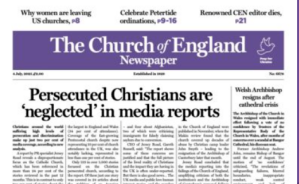
One of the world’s oldest continuously published faith-based newspapers has suspended printing operations following the death of its longtime owner, casting uncertainty over the future of a historic voice in Anglican journalism.
The Church of England Newspaper will halt publication “until further notice,” according to Editor Andrew Carey, who announced the decision last week following the passing of Keith Young, owner and director of parent company Political and Religious Intelligence Ltd., according to reporting by the Press Gazette. Young had provided the financial support needed to keep the paper running.
Founded as The Record in 1828, the London-based newspaper is considered one of the oldest religious news publications still in circulation. It merged with the Church Family Newspaper in 1949 and has long served as a platform for evangelical voices within the Church of England (C of E).
In his announcement, Carey recalled how a group of young evangelical clergymen set up "The Record" in 1828. One of its earliest subscribers and supporters was a young John Henry Newman, the famous theologian.
“The newspaper formed what became known as the ‘Recordite’ faction in the C of E opposing Tractarianism,” wrote Carey.
“It was in the 1950s that the 'Record' merged with 'The Church of England Family Newspaper' to become CEN. “
“And in more peaceful times post-war, the CEN also made a considerable contribution to building up the evangelical institutions of the C of E and supporting an open evangelicalism which up until today, I hope, remains thoughtful, orthodox, resourceful and generous. This is needed more than ever today.”
Despite its rich media heritage, Carey expressed regret to readers as he delivered the somber news about the newspaper’s uncertain future.
“I’m sorry to inform you however that the 'Church of England Newspaper' has had to review its operations following the passing of Keith Young, owner and director of Political and Religious Intelligence Ltd,” he wrote.
“Keith was generously the sole provider of additional finance to continue supporting the paper and we are now exploring all options to secure a future and hope that you will bear with us as we seek an orderly transition to serve our readers and subscribers, our advertisers and all other partners.”
Carey confirmed that no further published editions of the newspaper would be printed “until further notice”, adding, “though I will send out a weekly newsletter for the foreseeable future.”
The newspaper was based in London and published every other Friday on matters of interest to Anglicans.
The newspaper has previously had links to the Billy Graham evangelistic meetings taking place in 1955 in the U.K. Member of Parliament John Cordle, considered instrumental at the time in arranging for Graham to visit the country, bought the newspaper from Marshall’s, owner back then, with a view to complementing the fervour of Anglican evangelicalism at the time. John King was editor then and the circulation increased from 8,000 in 1960 to 19,000 just five years later.
However, like many other print publications, the Church of England Newspaper has faced mounting challenges in adapting to the rapidly changing digital media landscape.
“We promise to keep you informed as we fully explore all options before us,” concluded Carey.





